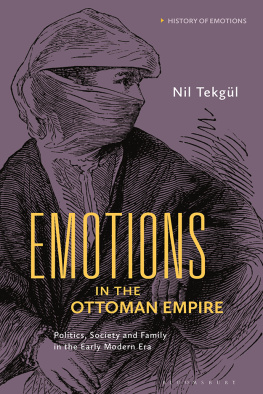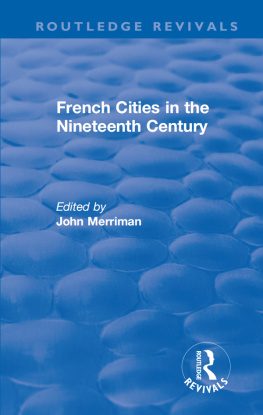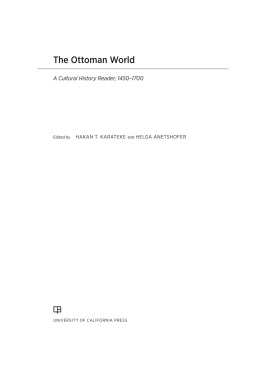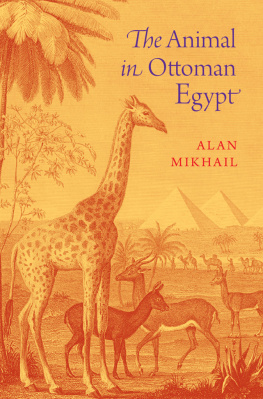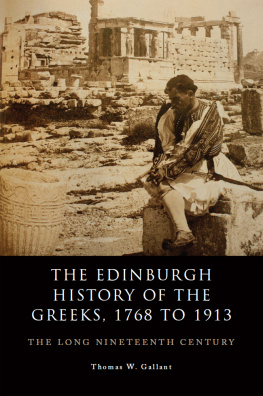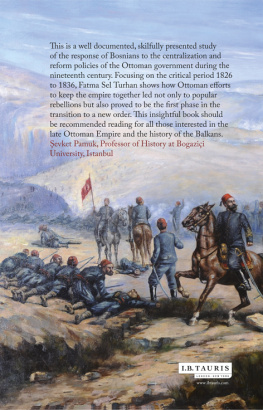
THE OTTOMAN STATE AND SOCIETIES IN CHANGE
When the Ottoman Empire undertook reforms to re-centralise and westernise in the first half of the 19th century, the first task was to introduce a new taxation system. Such a system necessitated the inspection of the population -- For this reason, just after the declaration of Tanzimat, taxpayers in the empire and their income were investigated. This volume examines temettuat defterleri belonging to five cities from Balkan to Anatolia and examines various socio-economic aspects of the period of change.
ISLAMIC AREA STUDIES
SERIES EDITOR
Sato Tsugitaka
Published
Volume 1
SLAVE ELITES IN THE MIDDLE EAST AND AFRICA:
A COMPARATIVE STUDY
Edited by Miura Toru and John Edward Philips
Volume 2
THE CONCEPT OF TERRITORY IN ISLAMIC LAW AND THOUGHT
Edited by Yanagihashi Hiroyuki
Volume 3
ISLAM IN POLITICS IN RUSSIA AND CENTRAL ASIA
Edited by Stphane Dudoignon and Komatsu Hisao
Volume 4
THE INFLUENCE OF HUMAN MOBILITY IN MUSLIM SOCIETIES
Edited by Kuroki Hidemitsu
Volume 5
THE OTTOMAN STATE AND SOCIETIES IN CHANGE
Edited by Hayashi Kayoko and Mahir Aydin
Islamic Area Studies
The Islamic Area Studies Project plans to do multidisciplinary research on Muslim societies in both the Islamic and non-Islamic worlds, by reflecting the fact that areas with close ties to Islam now encompass the world. The series presents the important new knowledge and debate achieved through international joint research about Islam as a religion and civilization, particularly emphasizing comparative and historical analysis. The series will hopefully provide multifaceted, useful information to deepen the readers understanding of the Islamic world.
Project Leader: Sato Tsugitaka
The University of Tokyo
THE OTTOMAN STATE AND SOCIETIES IN CHANGE
A Study of the Nineteenth Century Temettuat Registers
Edited by
HAYASHI Kayoko and Mahir AYDIN
First published in 2004 by
Kegan Paul International
This edition first published in 2010 by
Routledge
2 Park Square, Milton Park, Abingdon, Oxon, OX14 4RN
Simultaneously published in the USA and Canada
by Routledge
711 Third Avenue, New York, NY 10017
Routledge is an imprint of the Taylor & Francis Group, an informa business
Kegan Paul, 2004
All rights reserved. No part of this book may be reprinted or reproduced or utilised in any form or by any electronic, mechanical, or other means, now known or hereafter invented, including photocopying and recording, or in any information storage or retrieval system, without permission in writing from the publishers.
British Library Cataloguing in Publication Data
A catalogue record for this book is available from the British Library
ISBN 10: 0-7103-0801-9 (hbk)
ISBN 13: 978-0-7103-0801-6 (hbk)
Publishers Note
The publisher has gone to great lengths to ensure the quality of this reprint but points out that some imperfections in the original copies may be apparent. The publisher has made every effort to contact original copyright holders and would welcome correspondence from those they have been unable to trace.
CONTENTS
LIST OF CONTRIBUTORS
Japanese names are given using the surname first.
Tevfik GRAN | Istanbul University, Istanbul |
TAKAMATSU Yoichi | Tokyo University of Foreign Studies, Tokyo |
Svetla LANEVA | Institute of History in Bulgarian Academy of Sciences, Sofia |
Mahir AYDIN | Istanbul University, Istanbul |
EGAWA Hikari | Ritsumeikan University, Kyoto |
Arzu TERZ | Istanbul University, Istanbul |
Haydar ORUH | Trakya University, Edirne |
HAYASHI Kayoko | Tokyo University of Foreign Studies, Tokyo |
PREFACE
The present volume is the result of joint research, enabled within the Islamic Area Studies Project (IASP) and sponsored by the Japanese Ministry of Education, Culture, Sports, Science and Technology by means of a five-year grant-in-aid for scientific research.
In July 1999, as an activity of Unit 6 of IASP, I organized a small round-table conference entitled Source materials of Islamic area studies, inviting Prof. Mahir Aydn from Istanbul to an uncomfortably hot and humid Tokyo. I set up the Ottoman Temettuat registers as the conference topic, knowing that in 1988 the Prime Ministry Ottoman Archives of Turkey, in Istanbul, had made available to researchers for the first time approximately 17,500 volumes of the Temettuat registers. Joint research seemed inevitable because these registers had comprehensive and complicated contents. At the round-table in Tokyo, three contributors to the present volume, Takamatsu Yoichi, Egawa Hikari, and Mahir Aydm, presented papers based on their research at the Prime Ministry Ottoman Archives. Since the language of the conference was Turkish, the participants were few, but we enjoyed a lively discussion. Thereafter we continued working on Temettuat registers, and some colleagues kindly accepted our invitation to join the project and bring more examples of Temettuat register analysis.
Because the contents of these Temettuat registers are so comprehensive and complicated, drawing a coherent picture of them would not be possible within such short-term research as ours. Our aim is rather to present examples of how to use the newly available registers for research into Ottoman socio-economic history. We have looked at five cities of the Ottoman Empire, Samokov, Tatarpazarc, Balkesir, Gzelhisar- Aydm and Erzurum, and have also examined the process of conducting surveys for compilation of the registers. Our analyses can hopefully give new images of Ottoman cities and provinces in the period of change, thereby introducing the possibility of investigation based on new historical materials.
During the preparation of this volume, we received various types of assistance. First we would like to express our gratitude to the director and staff of the Prime Ministry Ottoman Archives of Turkey in Istanbul (Babakanlk Osmanl Arivi) for giving us full facilities for research. We would also like to thank Prof. Sato Tsugitaka, Prof. Komatsu Hisao, and Prof. Miura Toru, the director, vice-director, and publication section chief of IASP respectively, for their support to our joint research and publication. Finally, we give special thanks to Janet O. Philips, Ph.D., for her prompt and helpful editing as this volume took shape.
July 2004
HAYASHI Kayoko
Map: The Ottoman Empire in 1840s and the Location of the Five Cities
THE OTTOMAN STATE AND SOCIETIES IN CHANGE
A Study of the Nineteenth Century Temettuat Registers


